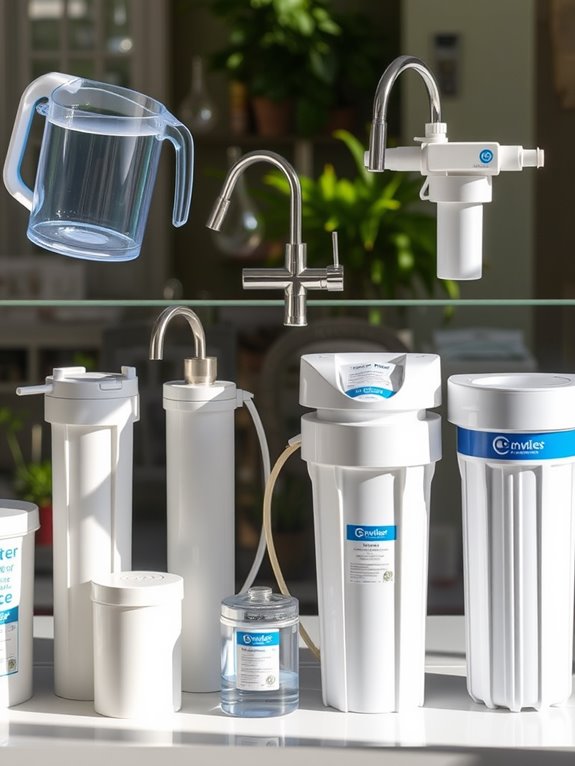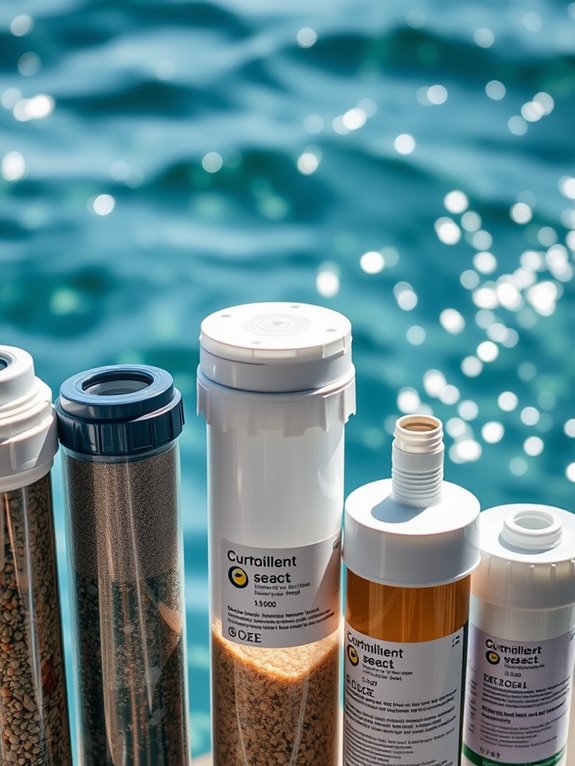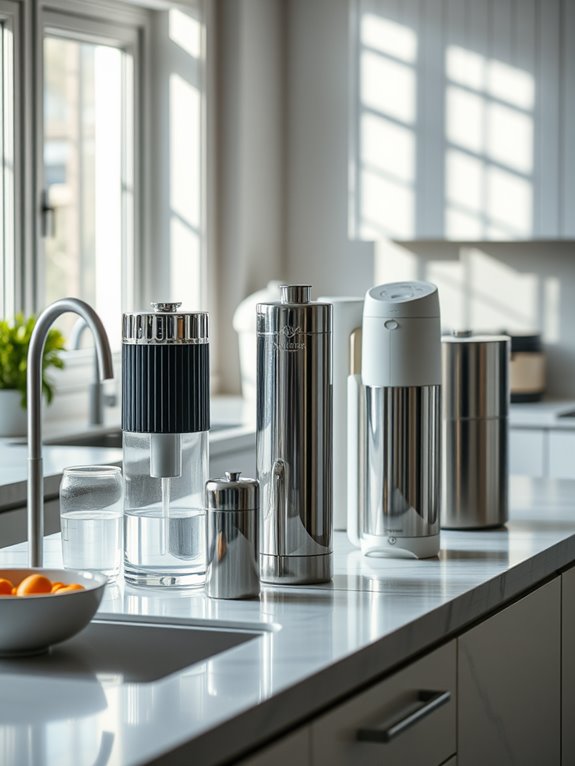Not all water filters are the same; they vary in methods, contaminants they remove, and maintenance needs. For instance, activated carbon filters enhance taste by removing chlorine, while reverse osmosis systems eliminate a broader range of impurities. Your choice depends on factors like water quality, household size, and budget. Understanding these differences can help you find the right filter for your needs. If you want to learn more about selecting the perfect filter, keep exploring your options.
Types of Water Filters

When it comes to water filters, you’ll find several types designed to tackle specific contaminants and improve taste.
Activated carbon filters are popular for removing chlorine and enhancing flavor. Reverse osmosis systems effectively eliminate a wide range of impurities, including heavy metals.
UV filters use ultraviolet light to kill bacteria and viruses, ensuring your water is safe to drink.
Pitcher filters are convenient and portable, perfect for quick use. Faucet-mounted filters attach directly to your tap, providing easy access to clean water.
Each type addresses different needs, so it’s crucial to choose one that fits your water quality concerns.
Filtration Methods Explained
Choosing the right water filter involves understanding the various filtration methods available. Each method has its own strengths and weaknesses, impacting the water quality you receive. Here’s a quick overview of some common filtration methods:
| Method | Description | Best For |
|---|---|---|
| Activated Carbon | Removes chlorine and odors | Improving taste |
| Reverse Osmosis | Forces water through a membrane | Reducing dissolved solids |
| UV Filtration | Uses UV light to kill bacteria | Disinfecting water |
| Ceramic | Filters out bacteria and sediments | Purifying drinking water |
| Ion Exchange | Removes heavy metals and hardness | Softening hard water |
Understanding these methods guarantees you choose the most effective filter for your needs.
Don’t miss out on related tips: Read this next: Does a Whole House Water Filter Reduce Water Pressure?
Contaminants Removed by Different Filters

Understanding which contaminants your water filter can remove is essential for ensuring safe drinking water. Different filters target specific pollutants.
Activated carbon filters excel at eliminating chlorine, volatile organic compounds, and some heavy metals.
Reverse osmosis systems are effective against bacteria, viruses, and dissolved solids.
If you’re concerned about lead or pesticides, look for filters that specifically mention these contaminants.
Water softeners primarily address hard minerals like calcium and magnesium.
Always check the filter’s specifications to see what it can handle. Knowing your filter’s capabilities helps you choose the right one for your needs and guarantees cleaner, healthier water.
Cost and Maintenance Considerations
Cost and maintenance are essential factors to take into account before investing in a water filter system.
You’ll find that prices vary greatly, depending on the type and brand. Initial costs might seem high, but consider ongoing expenses like filter replacements and energy consumption.
Some systems require frequent maintenance, while others are more hands-off. Think about how often you’ll need to replace filters, as this can add up over time.
Additionally, consider whether you’re comfortable performing maintenance tasks yourself or if you’ll need professional help.
Balancing cost and maintenance will help you choose a system that fits your budget and lifestyle.
Choosing the Right Water Filter for Your Needs

How do you determine the best water filter for your specific needs? Start by evaluating your water quality. You can test for contaminants like bacteria, lead, or chlorine.
Next, consider your household size and water consumption. If you have a larger family, a whole-house filter might be ideal. For smaller spaces, countertop or pitcher filters work well.
Think about installation and maintenance too—some filters require more effort than others.
Finally, set a budget. Options vary widely, so prioritize features that matter most to you.
Conclusion
So, you thought all water filters were created equal? Surprise! Choosing a filter isn’t just picking a fancy pitcher or a shiny faucet attachment. It’s like finding a soulmate—you’ve gotta consider your unique tastes, budget, and the nasty stuff lurking in that H2O. Don’t just grab the first thing you see; your health deserves better than a one-size-fits-all approach. Explore the details, or you might as well be drinking from a garden hose! Cheers to informed choices!

I’m Allen Kim, the chief editor of plumbinginto. I am a mid level plumber and assign to an local firm over 4 years of experience. During the working period, most of my experience is related to the house plumbing. I learned about the thing, when working with most experienced people in this sector, one must be as good as the inspector or better with knowledge of the project as well as the practical aspects of plumbing industry.